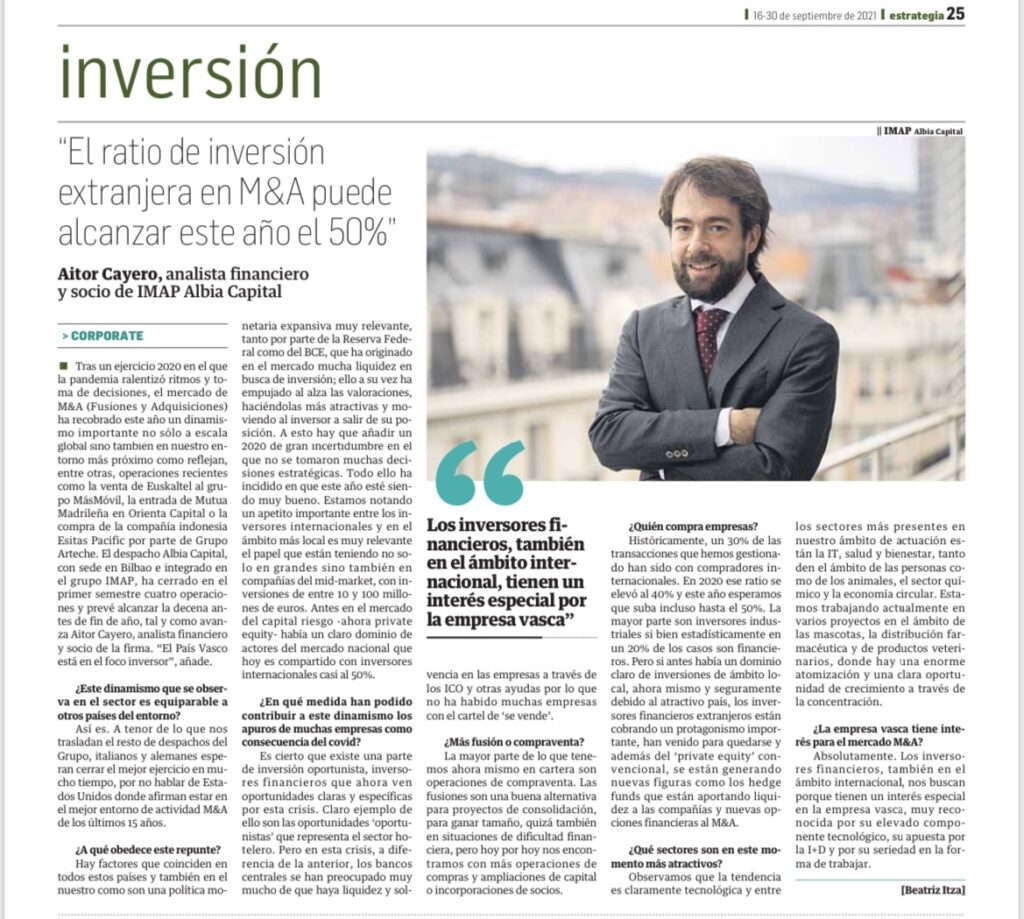‘The ratio of foreign investment in M&A could reach 50% this year’
Following the 2020 slowdown in which the pandemic put the brakes on business cycles and decision-making, significant levels of activity have returned to the M&A market this year, not just at a global scale, but also on our own doorstep. This may be seen, inter alia, from recent transactions such as the sale of Euskaltel to the MásMóvil group, the acquisition by Mutua Madrileña of a stake in Orienta Capital, or the acquisition of the Indonesian company Esitas Pacific by Grupo Arteche.
IMAP Albia Capital, as part of the IMAP Group with offices in Madrid and Bilbao, has completed four deals in the first half of the year and expects this total to reach ten before the year is out. According to Aitor Cayero, a partner at the firm, ‘The Basque Country is a target for investment’.
E.E. Is this level of activity comparable to that of neighbouring countries?
A.C. Yes it is. According to what we are hearing from other offices around the Group, in Italy and Germany, they expect this year to be the best for a long time, to say nothing of the United States, where they are reporting the best M&A outlook for the last 15 years.
E.E. What is behind this upturn?
A.C. There are certain factors present in all of these countries and also in our own country, such as an expansive monetary policy on a major scale, both by the Federal Reserve and the ECB, which has generated a lot of liquidity on the market that is looking for somewhere to invest. This has in turn pushed valuations up, making them more attractive and inducing investors to make a move. Added to this, 2020 was a year of great uncertainty during which few strategic decisions were made. All of these factors have led to this year being very good. We are seeing significant interest from international investors and, at a more local level, the effect they are having not just on large companies, but also on mid-market companies, is highly significant, with investments of between 10 and 100 million euros. Before, the venture-capital market – now private equity – was dominated by players from the domestic market, but now that space is shared with international investors making up nearly 50%.
E.E. To what extent have the difficulties that many companies have experienced as a result of COVID contributed to this market activity?
A.C. It’s true that there is an element of opportunist investment, i.e. financial investors that now see clear and specific opportunities thanks to the crisis. A clear example of this are the ‘opportunist’ opportunities available in the hotel sector. But in this crisis – in contrast to the previous one – central banks have taken great care to ensure that businesses have liquidity and solvency through government-backed loans granted by the ICO [Official Credit Institute] and other forms of aid, and this has reduced the number of companies seeking buyers.
E.E. More mergers or more takeovers?
A.C. The majority of the transactions we are dealing with right now are takeovers. Mergers are a good option for consolidation projects in order to grow in size, and perhaps also where there are financial difficulties, but right now we are seeing more takeovers and capital increases or the acquisition of new shareholdings.
E.E. Who is buying companies?
A.C. Historically, 30% of the transactions we have overseen have been with international buyers. In 2020 this proportion went up to 40%, and this year we are expecting it to rise to nearly 50%. The majority are industrial investors, although statistically in 20% of cases the buyers are financial. But whereas before there was a clear majority in favour of local-level investments, right now – and probably due to country attractiveness – foreign financial investors are becoming major players and are here to stay. And, in addition to conventional private equity, new concepts are emerging such as ‘search funds’ that are bringing liquidity to companies and new financial options for M&A.
E.E. What sectors are the most attractive right now?
A.C. From our observations, the trend is clearly towards the technological, and the sectors with the biggest presence in our field of activity are IT, and health and wellbeing, for example. There is a clear opportunity for growth.
E.E. Are Basque companies of interest for the M&A market?
A.C. Absolutely. Financial investors, also at an international level, turn to us because they have a special interest in Basque businesses, which are widely recognized for their high technological component, their commitment to R&D, and their professionalism in how they operate.


























